Staying Safe in Punta Cana: 2025 Health and Safety Tips for a Stress-Free Vacation
Understanding Punta Cana: The Basics
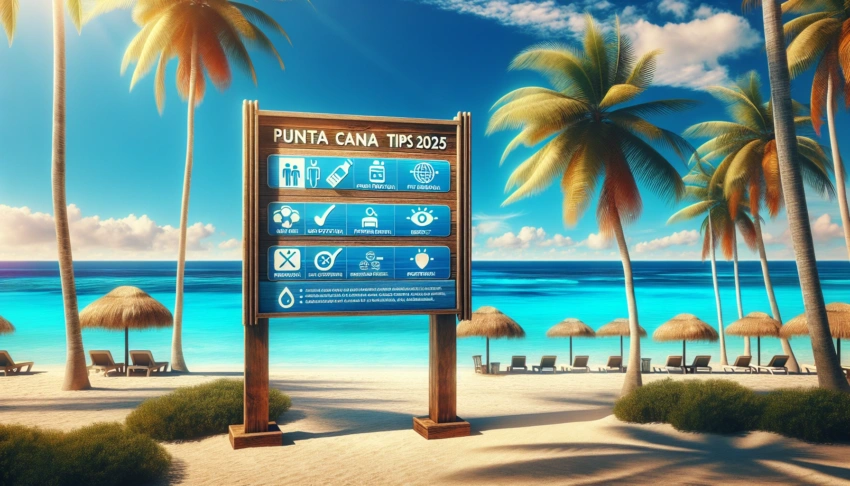
Staying Safe in Punta Cana: 2025 Health and Safety Tips for a Stress-Free Vacation
Prior to embarking on your journey to Punta Cana, having a solid understanding of its basics can significantly enhance your vacation experience, allowing you to be both safer and more prepared.
1. Overview of Punta Cana
Punta Cana, nestled in the Dominican Republic, is renowned for its breathtaking beaches and vibrant culture. Its geographical location on the island’s easternmost tip offers pristine coastal views and a tropical climate that is warm throughout the year. The average temperature ranges from 77°F to 82°F, making it a paradise for beach lovers. However, the region does experience a rainy season, typically from May to October, which is essential to consider when planning your trip.
The culture in Punta Cana is a blend of Spanish, African, and Taino influences, which is evident in the local music, dance, and culinary delights. The vibrant culture is celebrated through numerous festivals and events, such as the Punta Cana Carnival, which showcases colorful parades and traditional music. Understanding these cultural dynamics will not only enrich your experience but also help you engage respectfully with the locals.
2. Local Laws and Regulations
When visiting Punta Cana, it is crucial to acquaint yourself with the local laws and regulations to avoid any potential legal issues. The Dominican Republic has strict laws regarding drug possession and use, with severe penalties for violations. Therefore, it is imperative to steer clear of any illicit substances.
Additionally, the legal drinking age is 18, and drinking in public places is generally prohibited unless in designated areas. While the dress code is relaxed in tourist areas, modest attire is recommended when visiting local towns or religious sites. Understanding these regulations will ensure that your conduct aligns with local expectations, enhancing your safety and enjoyment.
3. Travel Advisory Updates
Keeping abreast of the latest travel advisories is essential for ensuring a safe trip to Punta Cana. The U.S. Department of State provides updated travel advisories and safety information specific to destinations, including Punta Cana. It is advisable to register with the Smart Traveler Enrollment Program (STEP) to receive real-time alerts and facilitate communication with the nearest U.S. embassy in case of emergencies.
Travel advisories often include information about health risks, political stability, and natural disaster warnings. By staying updated, you can make informed decisions regarding your travel plans and take necessary precautions to mitigate potential risks. It’s also wise to check for any entry requirements or restrictions that may have been implemented, especially in light of global health concerns.
In summary, understanding Punta Cana’s geography, culture, laws, and travel advisories is pivotal in crafting a vacation that is not only memorable but also safe and respectful of the local environment.
Health Precautions Before You Travel
Before you embark on your tropical escape to Punta Cana, it’s crucial to ensure that your health preparations are in place. By taking proactive health measures, you can enjoy a stress-free vacation, knowing that you are safeguarded against potential health risks.
1. Vaccinations and Medical Preparations
Before traveling to Punta Cana, reviewing the recommended vaccinations and medical preparations is essential to ensure your health and safety. While the Dominican Republic does not require any specific vaccinations for entry, the Centers for Disease Control and Prevention (CDC) advises certain vaccines. These typically include Hepatitis A and Typhoid due to potential exposure through contaminated food and water. Additionally, ensuring your routine vaccinations, such as Measles, Mumps, and Rubella (MMR) and Tetanus, are up-to-date is a prudent step.
For those with specific health conditions, consulting with your healthcare provider is wise to discuss any additional precautions or prescriptions you might need. Carrying a letter from your doctor that outlines any medications you are bringing is also advisable, to avoid issues at customs.
2. Travel Insurance Options
Investing in comprehensive travel insurance is a critical step in safeguarding against unforeseen health-related incidents while vacationing in Punta Cana. When selecting a travel insurance plan, consider options that cover medical emergencies, evacuation, and trip cancellations. Policies that include coverage for COVID-19-related incidents are especially pertinent in today’s travel climate.
Comparison of Travel Insurance Options
| Insurance Provider | Medical Coverage | Evacuation Coverage | COVID-19 Coverage | Trip Cancellation |
|---|---|---|---|---|
| Allianz Travel | Up to $50,000 | Included | Included | Included |
| World Nomads | Up to $100,000 | Included | Included | Optional Add-on |
| Travel Guard | Up to $75,000 | Included | Optional Add-on | Included |
Selecting the right plan can provide peace of mind, ensuring that you have a safety net should any issues arise. It’s always a good idea to read the fine print and understand what each plan covers, along with any exclusions.
3. Packing a Health Kit
An essential aspect of preparing for your trip is packing a well-equipped health kit. This kit should include items that cater to both your personal health needs and general travel ailments. Here’s a list of must-have items for your travel health kit:
- Prescription Medications: Ensure you have enough supply for the duration of your trip, plus a few extra days in case of travel delays.
- Over-the-counter Medications: Include pain relievers, antihistamines, and medications for digestive issues.
- First-aid Supplies: Band-aids, antiseptic wipes, and adhesive tape can handle minor cuts and scrapes.
- Insect Repellent: To protect against mosquitoes, which can carry diseases such as dengue fever.
- Sunscreen: A high-SPF sunscreen is important to protect against the intense Caribbean sun.
- Hand Sanitizer: Useful for maintaining hygiene when soap and water are not available.
By taking these health precautions before your journey, you are not only protecting your well-being but also ensuring a more enjoyable and worry-free vacation experience in Punta Cana.
Safety Tips for Accommodations
For a stress-free stay in Punta Cana, ensuring your accommodations are safe and secure is paramount. Whether you’re staying in a luxury resort or a cozy rental, taking the right precautions can make a significant difference in your vacation experience.
1. Choosing Safe Accommodations
Selecting the right place to stay involves more than just aesthetics and amenities; it’s crucial to prioritize safety. Start by researching areas known for their low crime rates. For example, neighborhoods like Cap Cana and Bavaro are popular among tourists for their gated communities and enhanced security measures.
Utilize online resources such as reviews on TripAdvisor and Booking.com to gain insights into the safety records of potential accommodations. Pay attention to comments about security staff, surveillance systems, and guest experiences regarding safety.
Factors to Consider When Choosing Accommodations
| Factor | Description | Importance |
|---|---|---|
| Location | Proximity to emergency services and safe neighborhoods | High |
| Security Features | Presence of CCTV, security personnel, and secure entrances | High |
| Guest Reviews | Feedback on safety from past guests | Medium |
| Emergency Procedures | Clear and accessible emergency plans and contacts | High |
2. Hotel Security Measures
Most reputable hotels in Punta Cana are equipped with various security features designed to protect guests. These may include 24/7 staffed front desks, key card access to rooms and facilities, and security cameras monitoring the premises. When checking in, inquire about the hotel’s emergency procedures and whether they offer in-room safes for securing valuables.
For added peace of mind, choose accommodations that offer additional security services, such as in-room safes, and ensure you know how to use them. Also, be mindful of your surroundings and report any suspicious activity to hotel management immediately.
3. Emergency Contacts and Procedures
Knowing whom to contact in case of an emergency can be a lifesaver. Upon arrival, familiarize yourself with the emergency exit routes and locations of fire extinguishers. Most hotels provide a guidebook or brochure that includes local emergency numbers, such as police, ambulance, and fire services, which can be indispensable during your stay.
Consider programming these numbers into your phone for quick access. Additionally, ask the front desk about the hotel’s specific emergency protocols, such as evacuation plans or shelter locations in case of severe weather.
Staying vigilant and informed about your accommodation’s safety measures not only enhances your comfort but also significantly reduces potential risks, allowing you to fully enjoy the vibrant and picturesque surroundings of Punta Cana.
Section 4: Navigating Punta Cana Safely
Exploring Punta Cana can be an exciting adventure, but maintaining awareness of your surroundings and adopting safe practices is crucial. Whether traveling by public transport, driving, or walking, understanding the local nuances ensures a stress-free experience.
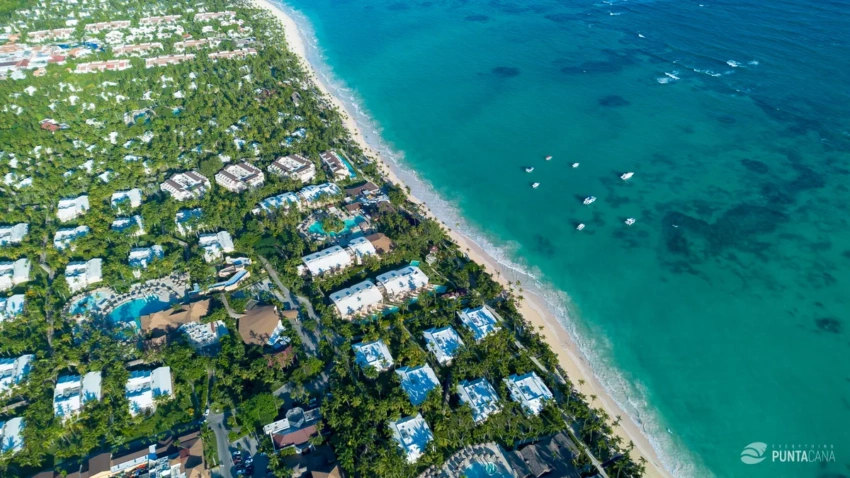
Aerial view of Punta Cana
1. Public Transportation Safety
Navigating Punta Cana via public transportation can be convenient and budget-friendly. However, ensuring your safety requires some diligence.
Public transport options include buses, known locally as “guaguas,” and shared taxis called “conchos.” While guaguas are affordable, they can be crowded, and routes are not always well-marked. It is advisable to confirm the destination with the driver before boarding and keep your belongings secure. Conchos offer a quicker option but may involve negotiating the fare; always settle on a price before your journey begins.
For a more comfortable and tourist-friendly experience, consider using reputable taxi services or rideshare apps available in the region. These options often provide fixed rates and can be safer alternatives, especially for late-night travel.
2. Driving and Car Rentals
Renting a car provides the freedom to explore Punta Cana at your own pace. However, understanding the local driving culture and regulations is essential for a safe journey.
Before renting, ensure the car rental service is reliable and offers comprehensive insurance. Some well-known international chains operating in Punta Cana include Hertz and Avis, which provide standard safety features and customer support.
The Dominican Republic drives on the right side of the road, and while main roads are well-maintained, rural areas may present challenges with potholes and narrow lanes. Driving defensively and adhering to speed limits is advisable. Additionally, be aware of local customs, such as the use of horns for signaling. If you plan to explore beyond city limits, consider renting a GPS device or using a reliable navigation app to avoid getting lost.
Comparing Car Rental Options in Punta Cana
| Provider | Insurance Options | Customer Support | Navigation Assistance |
|---|---|---|---|
| Hertz | Full Coverage | 24/7 Helpline | GPS Available |
| Avis | Limited and Full | On-site Assistance | App-Based Navigation |
| Local Rental Co. | Basic Coverage | Limited Hours | No GPS |
3. Walking and Exploring on Foot
Exploring Punta Cana on foot allows for an immersive experience in its vibrant culture and stunning landscapes. Nevertheless, pedestrian safety should be a priority.
Begin by familiarizing yourself with the area. Maps and tourist guides can be helpful, but it is equally important to trust your instincts and stay in well-populated areas. When walking at night, stick to well-lit streets and avoid isolated paths. It’s also wise to keep valuables such as phones and wallets out of sight.
For beach strolls, remember that some parts of the coastline may have restricted access. Always heed local advisories, which often indicate safe walking paths and swimming areas. When exploring markets or crowded events, be mindful of pickpockets. A crossbody bag can be a secure option to keep your belongings safe.
Our Best Villa Rentals in Punta Cana
For those exploring Punta Cana with the comfort of a private retreat in mind, consider our villa rentals. These accommodations offer safety and luxury, providing a serene escape after a day of exploration.
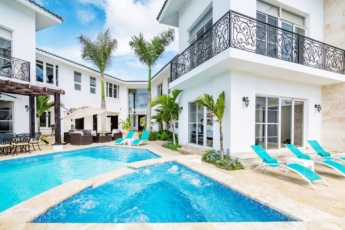
Huge Villa for Large Groups in Bavaro (Cocotal) - Up to 16 People With Pool, Jacuzzi, Chef & Maid
from $2621 night Read more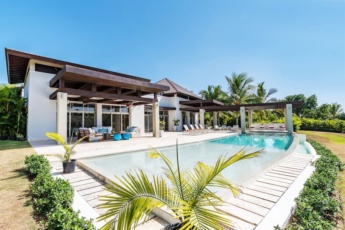
Casa de Campo Villa for Wedding or Private Events - With Huge Lawn, Pool, Jacuzzi, Golf Cart, Chef, Butler & Maid
from $3650 night Read more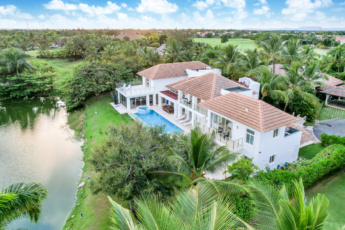
Two Luxury Villas in Cocotal for Large Groups - With Jacuzzi, Pools, Gym
from $3058 night Read more
Luxury 2-Level Villa for Rent at Puntacana Resort & Club - With Chef, Butler, Maid & Huge Pool
from $1872 night Read moreDining and Food Safety
A culinary journey in Punta Cana promises an unforgettable experience, blending vibrant flavors with cultural richness. However, ensuring your food safety is paramount to enjoying your gastronomic adventures without worry.
1. Choosing Safe Dining Options
Selecting where to eat in Punta Cana is a delightful task, given the abundance of culinary offerings. Yet, prioritizing safety while making your choices is crucial. Opt for restaurants and food vendors that are known for their good hygiene practices. Restaurants within well-known hotels or resorts often adhere to international food safety standards. Local establishments with high customer turnover are also a good bet, as this indicates fresh food is regularly prepared.
Factors to Consider When Choosing a Restaurant
| Factor | Importance | Example | Recommendation |
|---|---|---|---|
| Hygiene | Critical | Clean tables and floors | Inspect cleanliness before ordering |
| Reputation | Important | Online reviews | Check ratings on platforms like TripAdvisor |
| Food Handling | Essential | Gloved staff | Observe food handling practices |
Exploring open-air markets is also a great way to immerse yourself in local culture. However, ensure that the stalls you choose are reputable and follow basic sanitation practices. When in doubt, opt for cooked dishes over raw food items, which reduces the risk of contamination.
2. Avoiding Foodborne Illnesses
To fully enjoy Punta Cana’s local dishes without compromising your health, it’s important to take proactive measures against foodborne illnesses. One effective method is to consume thoroughly cooked food, as high temperatures can kill harmful bacteria. Be cautious with street food, opting only for vendors that visibly adhere to good sanitation practices.
A handy tip is to observe where locals choose to eat—this is often a good indicator of safe and delicious food.
If you have a sensitive stomach, it’s advisable to peel fruits yourself or choose those that can be washed thoroughly. Additionally, be cautious with dairy products unless you’re certain of their storage conditions.
3. Beverage Safety and Hydration
Staying hydrated in Punta Cana’s tropical climate is essential, but ensuring the safety of your beverages is equally important. Opt for bottled water, which is widely available and generally considered safe. Always check the seal to ensure it has not been tampered with. Avoid consuming tap water or ice made from tap water unless you’re certain of its quality.
To keep hydrated, carry a reusable water bottle and refill it with filtered water available at most hotels and resorts.
When it comes to enjoying local drinks, such as fresh fruit juices or coconut water, choose reputable sources to minimize risk. Alcoholic beverages should also be consumed in moderation, and always ensure the establishment follows safe beverage practices.
Our Best Villa Rentals in Punta Cana
Immerse yourself in the luxury and comfort of our selected villa rentals in Punta Cana, offering exceptional privacy and top-tier amenities. Enjoy a stress-free vacation by choosing accommodation that prioritizes your safety and satisfaction.

Modern & New Luxury Villa for Rent in Punta Cana - Lakefront Golf Villa with Cook, Maid, Golf Cart
from $1560 night Read more
Huge Luxury Cap Cana (Las Palmas) Golf Villa for Rent - Chef, Butler, Maid, 2 Golf Carts, Jacuzzi, Semi-Olympic Pool
from $3744 night Read more
Brand-New Oceanfront Luxury Cap Cana 10BR Villa - Private Beach, Full Staff, Home Theater
from $8648 night Read more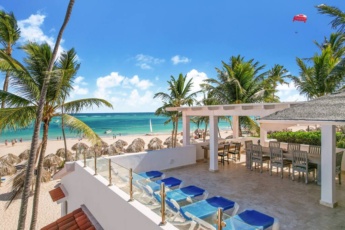
New Bávaro Beach Beachfront Condo for Rent - Stunning Ocean View, Housekeeper & Rooftop Terrace
from $811 night Read moreBeach and Water Safety
Punta Cana’s stunning beaches and azure waters offer a paradise for visitors, but prioritizing safety ensures these experiences remain blissful and hazard-free.
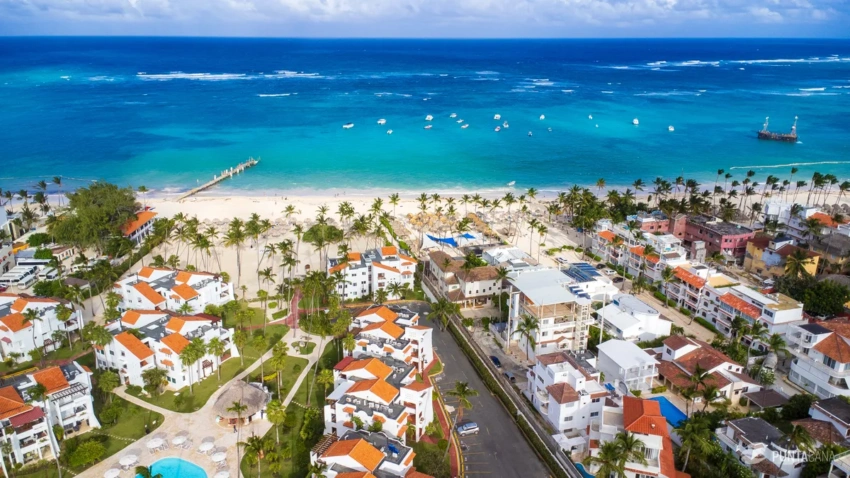
Punta Cana
1. Swimming Safety Guidelines
Swimming in Punta Cana’s ocean or resort pools can be exhilarating, but it’s essential to follow safety guidelines to ensure a worry-free experience. The ocean currents can be deceptively strong, so it’s vital to swim only in designated areas supervised by lifeguards. Pay attention to the flags on the beach, which indicate the current conditions: green for safe, yellow for caution, and red for dangerous.
When it comes to pools, ensure that they are well-maintained and have safety measures such as depth markings and life-saving equipment. If traveling with children, always supervise them closely and consider enrolling them in swimming lessons before your trip.
Safety Flag Indicators
| Flag Color | Meaning | Action |
|---|---|---|
| Green | Safe to Swim | Enjoy the water, but remain cautious |
| Yellow | Caution Advised | Be more vigilant, currents are stronger |
| Red | Dangerous Conditions | Avoid swimming, strong currents or hazardous conditions |
2. Water Sports Safety
Engaging in water sports such as snorkeling, jet skiing, or diving can greatly enhance your Punta Cana experience. However, safety should remain a top priority. Always choose licensed and reputable operators for any water activity. Verify that the equipment is in good condition and that safety instructions are provided before you begin.
For those planning to snorkel or dive, it’s crucial to have a buddy system and to be aware of the sea life you might encounter. While most marine creatures are harmless, it’s best to maintain a respectful distance to avoid any potential issues. Additionally, be aware of weather conditions before heading out, as sudden storms can occur.
3. Sun Protection and Heat Safety
The tropical sun in Punta Cana can be intense, making sun protection a necessity for any beach-goer. It’s recommended to use a broad-spectrum sunscreen with a high SPF and to reapply every two hours, or more frequently if swimming or sweating. Wearing a hat, sunglasses, and protective clothing can provide additional defense against harmful UV rays.
Heat-related illnesses are a risk in this climate, so it’s essential to stay hydrated by drinking plenty of water throughout the day. Take breaks in the shade, especially during the peak sun hours between 10 a.m. and 4 p.m. Recognize the signs of heat exhaustion, such as dizziness, nausea, or excessive sweating, and seek shade and hydration immediately if they occur.
Our Beachfront Accommodations in Punta Cana
Discover a range of exquisite beachfront accommodations that offer not only luxury but also the perfect base for exploring the beaches of Punta Cana safely and comfortably.
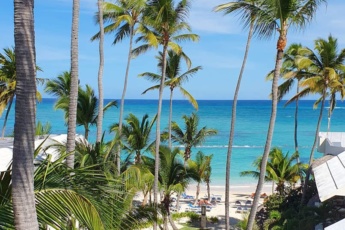
Incredible Two Story Penthouse with Ocean View E4
from $277 night Read more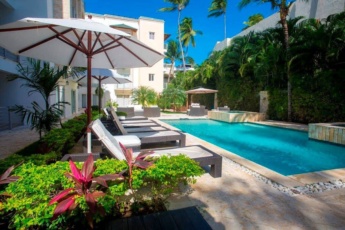
Punta Cana Condo for Rent - Secured Beachfront Rentals in Bavaro
from $177 night Read more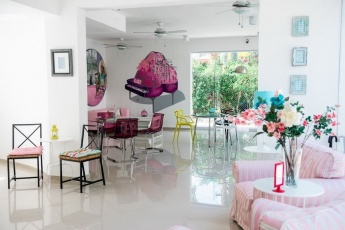
Modern, Fresh & Renovated Boutique Hotel Art Villa, Los Corales Beach
from $45 night Read more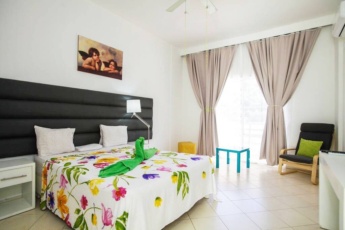
Bed and Breakfast room in Punta Cana, Bavaro - Art Villa Hotel, near the beach (5 min)
from $48 night Read moreDealing with Emergencies
In the unlikely event of an emergency during your Punta Cana vacation, being prepared and informed can make all the difference. From accessing medical services to reporting crimes or preparing for natural disasters, having a plan in place will ensure a stress-free holiday.
1. Accessing Medical Services
Punta Cana is equipped with several top-notch medical facilities that cater to tourists. Understanding how to access these services efficiently is crucial. The Hospiten Bávaro, located at Avenida España, Bávaro, is a well-known facility offering comprehensive healthcare services, including emergency care. It’s staffed with English-speaking professionals and is equipped with modern medical technology.
The information provided here is intended for general informational purposes and might not reflect the most current health facility details. For the most accurate and up-to-date information, please confirm with official sources.
When seeking medical help, it’s advisable to carry a copy of your travel insurance policy, which can cover medical expenses. Keep a list of emergency numbers, including your hotel’s front desk, the local emergency medical services, and your travel insurance provider, readily accessible.
Comparison of Key Medical Facilities in Punta Cana
| Facility Name | Location | Services Offered | Contact Information |
|---|---|---|---|
| Hospiten Bávaro | Avenida España, Bávaro | Emergency Care, General Practice | (+1 809 686 1414) |
| Centro Médico Punta Cana | Plaza Coral, Punta Cana | 24/7 Emergency, Specialty Services | (+1 809 552 1506) |
2. Reporting Crimes or Incidents
While Punta Cana is generally safe, knowing how to report a crime or incident is essential. If you encounter a crime, contact the local police immediately. The tourist police, known as POLITUR, are specifically trained to assist tourists and can be contacted at (+1 809 200 3500). They can provide assistance in English and help navigate any legal processes.
When reporting an incident, provide as much detail as possible, including the time, location, and any identifying characteristics of the people involved. Additionally, inform your hotel or accommodation provider so they can assist and provide further support.
3. Natural Disaster Preparedness
Punta Cana is occasionally affected by tropical storms and hurricanes, particularly during the Atlantic hurricane season from June to November. It’s essential to stay informed about weather conditions through reliable sources like the National Hurricane Center.
Most resorts and hotels in Punta Cana have detailed emergency procedures in place. Upon arrival, familiarize yourself with these plans and locate the nearest emergency exits and shelters. It’s also wise to pack a small emergency kit, including essentials like a flashlight, batteries, bottled water, and non-perishable snacks.
By preparing for potential emergencies, you can enjoy the beauty of Punta Cana with peace of mind, knowing you are well-equipped to handle unexpected situations.
Frequently Asked Questions
What are some general safety tips for travelers visiting Punta Cana in 2025?
When visiting Punta Cana in 2025, be mindful of your surroundings, especially in crowded places. Use reputable transportation services, and avoid walking alone at night. Keep your valuables secure and be cautious of your personal belongings in public areas. Always drink bottled water and stay hydrated, particularly in the hot climate. Stay updated on any local advisories or warnings.
Is it safe to drink tap water in Punta Cana?
It is not recommended to drink tap water in Punta Cana. Instead, opt for bottled water, which is widely available and usually provided by hotels and resorts. Use bottled water for drinking, brushing your teeth, and making ice.
Always prioritize your health by avoiding tap water to prevent any potential illness.
Are there any health precautions I should take before traveling to Punta Cana?
Consult your healthcare provider before traveling to Punta Cana to ensure you are up-to-date with routine vaccinations. Consider vaccinations for hepatitis A, hepatitis B, and typhoid, which are recommended for travelers in the region. Additionally, pack a basic first-aid kit and any necessary prescription medications.
Please consult a healthcare professional for personalized medical advice.
What should I do in case of a medical emergency in Punta Cana?
In case of a medical emergency, contact the local emergency services by dialing 911. Many resorts have on-site medical facilities or can assist in arranging transport to a nearby hospital. It’s advisable to have travel insurance that covers medical emergencies.
Ensure your travel insurance policy is current and covers international medical emergencies.
How can I protect myself from sunburn and heat-related illnesses in Punta Cana?
To protect yourself from sunburn and heat-related illnesses, apply a high-SPF sunscreen regularly, wear a wide-brimmed hat and sunglasses, and seek shade during peak sun hours (10 AM to 4 PM). Stay hydrated by drinking plenty of water and avoid excessive alcohol consumption, as it can lead to dehydration.
What travel insurance considerations should I keep in mind for my trip to Punta Cana?
When purchasing travel insurance for Punta Cana, ensure it covers medical emergencies, trip cancellations, and lost or stolen belongings. Check if your policy includes coverage for activities you plan to participate in, such as water sports or excursions.
Review your travel insurance policy details before departure to ensure complete coverage.
Are there any specific scams or tourist traps to be aware of in Punta Cana?
Be cautious of overly friendly strangers offering unsolicited help or services, as they may expect payment. Avoid unofficial tour guides and always verify the credentials of service providers. When using ATMs, opt for those inside banks or well-lit areas to prevent card skimming.
Is Punta Cana safe for solo travelers?
Punta Cana is generally safe for solo travelers, but it’s important to take standard precautions. Stay in well-reviewed accommodations, inform someone about your itinerary, and avoid isolated areas, especially at night. Use only trusted transportation options and remain vigilant in crowded places.
